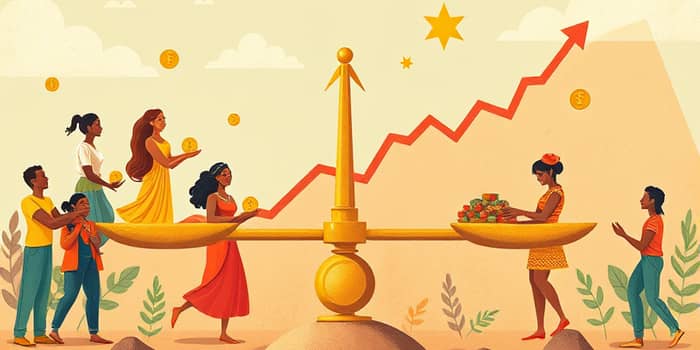Inflation touches every aspect of our lives, from the price we pay for groceries to the interest on our savings. By understanding its mechanisms and impacts, you can make informed decisions to navigate economic ups and downs with confidence.
Understanding Inflation and Its Measurement
Inflation represents the rate at which the general price level of goods and services rises, causing each dollar to buy fewer items over time. Policymakers and analysts track inflation using indices like the Consumer Price Index (CPI), which measures price changes for a representative basket of goods and services.
As of the 12 months ending January 2025, the CPI-U increased by 3% unadjusted, with a 0.5% uptick in January alone. Such data informs central banks on whether to adjust monetary policy to maintain steady economic growth and stability.
What Drives Rising Prices?
Inflation stems from various sources, each influencing the economy differently. Recognizing these causes can help you anticipate price changes and adjust your financial plans.
- Demand-pull inflation: Occurs when consumer demand outpaces supply, often fueled by increased spending or government stimulus.
- Cost-push inflation: Driven by rising production costs—higher wages or energy expenses—that businesses pass on to consumers.
- Monetary policy and expectations: Rapid money supply growth, combined with expectations of future price hikes, can become self-fulfilling.
- Supply shocks: Events like natural disasters or geopolitical conflicts disrupt supply chains, triggering sudden price surges.
Exploring Different Inflation Scenarios
Not all inflation is created equal. Economists distinguish among several forms, each with unique implications:
- Disinflation: A slowdown in the inflation rate—prices still rise but more slowly.
- Deflation: A general decline in prices, which can lead to reduced consumer spending and economic stagnation.
- Hyperinflation: Extremely rapid and uncontrollable price increases, often eroding trust in the currency.
The Impact on Your Everyday Life
When inflation rises, your purchasing power declines. For families and individuals, this means budgets are stretched thinner as essentials like food, housing, and healthcare cost more.
Workers may demand higher wages to keep up with price increases. If wages lag behind inflation, real income falls, affecting lifestyle and long-term plans. Meanwhile, central banks often raise interest rates to curb inflation, making loans more expensive but potentially preserve your purchasing power for savers.
Homeowners might see property values climb, boosting equity. Renters and first-time buyers, however, face higher barriers to entry as mortgage rates increase. Investors may shift toward asset classes that historically outpace inflation, such as real estate, commodities, or certain stocks.
Lessons from History and Recent Trends
Inflation has shaped economies for centuries. The influx of precious metals into Europe in the 16th century flooded markets with currency, sparking sustained price rises. In 2008, surging oil and food costs triggered a global wave of cost-push inflation, illustrating how interconnected markets amplify shocks.
Between 2022 and 2025, inflation surged worldwide as economies rebounded from the pandemic. Supply chain disruptions, energy price volatility, and geopolitical tensions combined to drive prices higher, reminding us that global forces can have direct, local consequences.
How Central Banks Strive for Stability
Central banks aim to maintain inflation near target levels—often around 2%—to support healthy economic activity. Their primary tool is the adjustment of interest rates: raising rates to slow inflation or cutting rates to stimulate growth.
Other measures include managing the money supply through open market operations and, in some cases, direct intervention in key markets. The goal is to avoid the extremes of prolonged high inflation or deflation, both of which can disrupt financial planning and investment.
Strategies to Protect Your Financial Future
While individuals cannot control macroeconomic forces, there are practical steps you can take to adapt your budget and spending and build a resilient financial portfolio:
- Review and adjust your household budget regularly to account for rising costs.
- Explore investments that historically outpace inflation, such as Treasury Inflation-Protected Securities (TIPS) or real assets.
- Consider diversifying income streams, for example through part-time work, freelancing, or passive income investments.
- Maintain an emergency fund in a high-yield account to cushion unexpected price spikes.
- Pay down high-interest debt quickly to reduce the impact of rising borrowing costs.
Taking Charge and Looking Ahead
Inflation can feel like an uncontrollable tide, but by staying informed and proactive, you can safeguard your long-term financial health. Monitor economic indicators like the CPI, follow central bank announcements, and review your financial plans at least annually.
Ultimately, knowledge is your most powerful tool. When you empower yourself with knowledge about inflation’s origins, effects, and management, you transform uncertainty into opportunity. By acting strategically today, you can weather rising prices and build a stable foundation for tomorrow.
Inflation affects everyone, but those who understand it can adapt confidently and thrive, regardless of economic conditions. Take these insights and strategies as your guide to a future where your finances remain strong and your goals stay within reach.
References
- https://www.investopedia.com/terms/i/inflation.asp
- https://www.imf.org/en/Publications/fandd/issues/Series/Back-to-Basics/Inflation
- https://www.meetbreeze.com/blog/what-is-inflation/
- https://cleartax.in/s/inflation-deflation
- https://www.pgpf.org/article/what-is-inflation-and-why-does-it-matter/
- https://www.quickenloans.com/learn/effects-of-inflation
- https://www.equifax.com/personal/education/personal-finance/articles/-/learn/what-is-inflation/
- https://www.rba.gov.au/education/resources/explainers/causes-of-inflation.html










